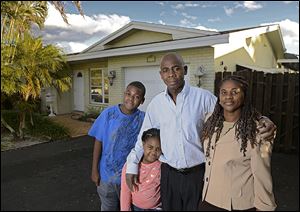
‘Boomerang’ buyers get another chance
Those crushed under housing collapse dig out, get back into own homes
3/2/2014
Ganel Appolon, with his family, from left, Stanley, Jessica, and his wife, Maude, lost his home three years ago in the economic downturn. They recently purchased this home in Fort Lauderdale, Fla. Housing experts say that these so-called ‘boomerang buyers’ are key to sustaining the housing recovery.
FORT LAUDERDALE, Fla. — Just 10 days before Christmas in 2009, Ganel Appolon found an envelope taped to his front door. He and his family were being evicted from their Tamarac, Fla., home. Mr. Appolon had fallen behind on his mortgage payments, and the lender repossessed the property under terms of his bankruptcy filing.
Despite the financial setback, Mr. Appolon vowed to own again.
He spent the next four years saving money and rebuilding his credit. Last fall, he qualified for another mortgage and in December bought a three-bedroom home in Fort Lauderdale, Fla., for $177,500.
“I feel free,” said Mr. Appolon, a 46-year-old electrician. “My kids are really, really happy. They kept saying, ‘Thank you, Daddy. Thank you, Daddy.’ ”
Mr. Appolon’s experience may give hope to tens of thousands of people snared in the housing collapse. Many of those people thought they’d never own again — or at least have to wait a decade or longer to even think about it. Instead, lenders and real estate agents say many former homeowners are recapturing the American Dream as “boomerang buyers.”
“Time will heal everything, and that’s what’s happening here,” said Jim Flood, regional manager for Supreme Lending in Plantation, Fla. “I think it’s great that people are getting a second chance. Don’t we all want that in life?”
How many are getting that chance? No one knows. The government and housing industry don’t track it. But lending titans such as Bank of America, as well as community banks and credit unions, typically follow the guidelines from government-run mortgage companies Fannie Mae and Freddie Mac, which together insure about half of the nation’s home loans.
Fannie and Freddie require someone with a foreclosure to wait seven years before qualifying for a new mortgage. But if the foreclosure was included in a bankruptcy, as it was for Mr. Appolon, the borrower has to wait only four years.
A person who unloaded a home before the bank foreclosed — such as through a short sale — must wait two years to get another Fannie or Freddie loan.
A consumer seeking a Federal Housing Administration-backed loan can qualify three years after a foreclosure or short sale.
Former owners who lost a home because of at least a 20 percent cut in pay may be able to qualify for another mortgage after only a year through FHA’s Back to Work program.
Catherine Perez used that program to buy a four-bedroom home in Pembroke Pines, Fla., in November. Three years ago, she lost a Davie, Fla., townhome in foreclosure after her adjustable-rate mortgage payment jumped $400 a month to $2,200.
Ms. Perez, 32, lived with her mother for a year to save money and then rented. She signed up for a credit restoration program through the nonprofit agency United Financial Counselors, raising her credit score by more than 100 points to 672 — enough to get a mortgage. The highest score is 850.
Ms. Perez and her fiance qualified for a 30-year, fixed-rate mortgage at 4.375 percent. They put down about $18,000 on the $335,000 purchase.
“I’m so relieved,” she said. “I wanted to have a home for my future kids.”
Homeowners who lost their properties make up a pool of potential buyers who could help bolster demand just as last year’s frenzy cools, analysts say.
“We’re about three years past the peak of the foreclosures, and that’s about the time when most people would qualify for another loan,” said Daren Blomquist, spokesman for RealtyTrac in Irvine, Calif. “The market really needs boomerang buyers to maintain the current recovery.”
Some boomerang buyers are required to make down payments of at least 20 percent, while others can put down as little as 3.5 percent or 5 percent — much the same as people without credit problems.
Ryan Paton, head of Capitol Lending Group in Fort Lauderdale, said lenders are willing because they realize a large group of otherwise responsible borrowers were trapped in a housing debacle not likely to be seen again, he said.
“As long as they’ve saved money and re-established their credit, they’re fantastic buyers,” he said.